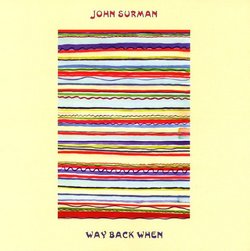Previously unreleased pre-fusion classic
Troy Collins | Lancaster, PA United States | 05/29/2005
(4 out of 5 stars)
"First impressions can be deceptive. At first listen, "In A Silent Way," Miles Davis' seminal 1968 pre-fusion record comes to mind. Opening with an electric bass ostinato, skittering cymbal splashes and some ruminative electric piano before the rhythm section kicks it into high gear with a taut four/four high hat rhythm (ala prime Tony Williams) led by a clarion soprano saxophone solo that spirals out variation after variation on the theme. But where is the master? When does Miles enter the fray? Or is this not his record?
Collective Consciousness is a method of explaining the concurrent discoveries of mankind across the world. Such a theory may help explain why British saxophonist John Surman's lost 1969 recording "Way Back When" sounds so akin to Miles Davis' experiments at the time, albeit from halfway around the world.
Although Surman and Davis had a mutual acquaintance in John McLaughlin, Surman never played with Miles. But hearing these 1969 sides, recorded and released only months apart from Davis' own aforementioned record, one can not only hear Mile's influence, but the more agitated sounds he would reveal a year or two down the line. Not so much a chicken and egg argument as an indication of the amount of influence artists tend to have on one another, "Way Back When" is an exemplary pre-fusion document, rugged and impassioned in a way that later crossover attempts lacked.
There are marked differences between Surman and Davis' approaches though. Surman's burly baritone work has outre tendencies that Davis would never have entertained. The same driving rhythmic intensity is here however. This group can whip up a propulsive frenzy as easily as they can ease back into the groove and steer the listener into more introspective territory. An essential document in the annals of electro-acoustic jazz, "Way Back When" is not only a must have for fans of the genre, but an exceptionally executed program of stirring late 1960's jazz."
A lost masterpiece rediscovered
Stephen Silberman | SF, CA USA | 05/28/2005
(5 out of 5 stars)
"Recorded in late 1969, this outstanding jam session features British experimental-jazz pioneers John Surman, John Taylor, John Marshall, Brian Odgers, and Mike Osborne playing their butts off in the shadow of Miles Davis' electric breakthrough albums "Filles de Kilimanjaro" and "In a Silent Way." The similarities to Miles' modes are obvious -- Taylor's nimble Fender Rhodes lines, Surman's post-Coltrane sax excursions on baritone and soprano, the trance-like immersion in haunting grooves -- but instead of coming off like an imitation, "Way Back When" stands firmly on its own as a spirited homage to the distinctive blend of acoustic and electric instruments that marked the birth of fusion without any of the ponderous excess that weighed down later elaborations in that form.
With the Fender Rhodes electric piano making a resurgence among hipsters in recent years courtesy of groups like Radiohead and the Beastie Boys and jazz players like Uri Caine, "Way Back When" ironically sounds way ahead of its time. (The master tapes were lost and rediscovered in 2003, and surely the album's title is an afterthought.) John Marshall's percussion is an energetic compliment to the horns, and Brian Odgers' funky bass lines give the music a driving momentum.
Surman and Taylor went on to stellar careers recording for the austere ECM label, and it's nice to hear them playing here with risk, fire, and a kind of offhand intensity that pointed the way toward an intelligent, spare kind of fusion that turned out to be short-lived; besides Miles' own masterworks, only Joe Henderson's exquisite, hard-to-find "Power to the People" and Miroslav Vitous' recently rereleased "Infinite Search" come to mind as examples of where music like this could have gone. If you're a fan of that period of Miles' music, or you're interested in hearing Surman and company in a more informal setting, you have to check this out."

